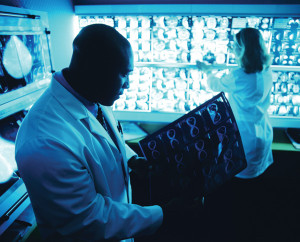Alzheimer’s Basics: Can Alzheimer’s be Diagnosed?
 A common question we receive at the Alzheimer’s Association is “Can Alzheimer’s be diagnosed?” It’s a valid question as many experts have said that Alzheimer’s can only be definitively diagnosed at the time of autopsy when the brain can be physically examined.
A common question we receive at the Alzheimer’s Association is “Can Alzheimer’s be diagnosed?” It’s a valid question as many experts have said that Alzheimer’s can only be definitively diagnosed at the time of autopsy when the brain can be physically examined.
However, that isn’t the whole answer to the question of whether this disease can be diagnosed. The truth is, it’s estimated that a skilled physician can diagnose Alzheimer’s with more than 90 percent accuracy. Diagnosis is achieved through very careful medical evaluation, including:
- A thorough examination of medical history
- Mental status testing
- A physical and neurological exam
- Tests (such as blood tests and brain imaging) to rule out other causes of dementia symptoms
A diagnosis of Alzheimer’s is important for people with the disease and their families as it allows:
- A better chance of benefiting from treatment
- More time to plan for the future
- Reduced anxiety about unknown problems
- Increased chances of participating in clinical drug trials, helping advance research
- An opportunity to participate in decisions about care, transportation, living options, financial and legal matters
- Time to develop a relationship with doctors and care partners
- Benefit from care and support services, making it easier forindividuals and families to manage the disease
Typically, the first step in obtaining a diagnosis is contacting your regular primary care physician or internist about your concerns regarding memory loss. Primary care doctors may oversee the diagnostic process themselves and/or refer you to a physician who specializes in the diagnosis and treatment of Alzheimer’s disease and related dementias. Specialists include:
- Neurologists, who specialize in diseases of the brain and nervous system
- Psychiatrists, who specialize in disorders that affect mood or cognitive functioning
- Psychologists with special training in testing memory and other mental functions
If you have questions about diagnosis, please call the Alzheimer’s Association for help and guidance. We are available any time, day or night at 800.272.3900 or www.alz.org.


















Remember, tests are done to determine the cause of your symptoms or disorder. Since the blood goes around the body, it can carry traces of the illness you have wherever it is, brain, hands, feet, anywhere within your body. Next time a doctor explain the results of your blood test, don’t be shy to ask for explanations, indications and what does those names and numbers mean.:
Most recent blog post on our very own blog
<,http://www.foodsupplementdigest.com/taurine-side-effects/